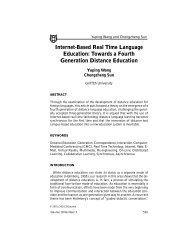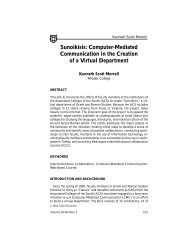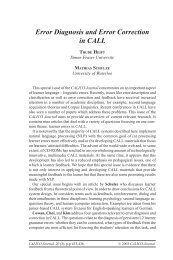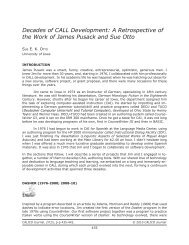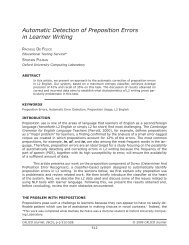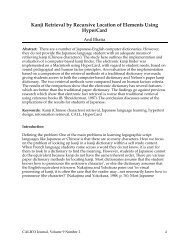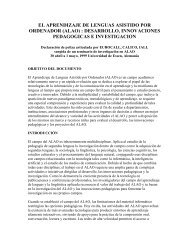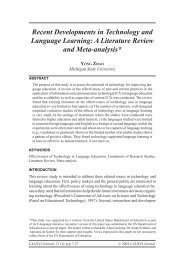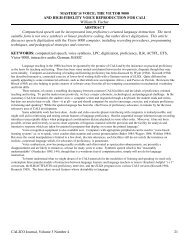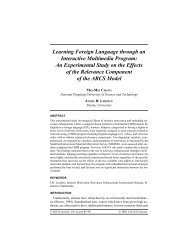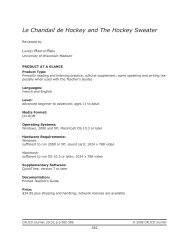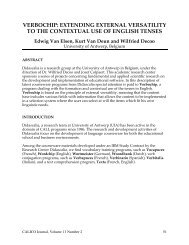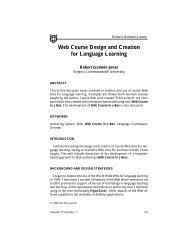The Role of Students' Attitudes and Motivation in Second ... - CALICO
The Role of Students' Attitudes and Motivation in Second ... - CALICO
The Role of Students' Attitudes and Motivation in Second ... - CALICO
You also want an ePaper? Increase the reach of your titles
YUMPU automatically turns print PDFs into web optimized ePapers that Google loves.
Eiko Ushida 57<br />
it difficult to self-direct their learn<strong>in</strong>g <strong>and</strong>, therefore, tended to procrast<strong>in</strong>ate. Lastly,<br />
teachers as the ma<strong>in</strong> po<strong>in</strong>t <strong>of</strong> contact seemed to have a big impact on the student<br />
learn<strong>in</strong>g experience. Additionally, Ushida <strong>and</strong> Igarashi (2001) <strong>in</strong>vestigated<br />
the learn<strong>in</strong>g experiences <strong>of</strong> two LOL students’ who kept learner diaries while tak<strong>in</strong>g<br />
Elementary French onl<strong>in</strong>e <strong>and</strong> Elementary Spanish onl<strong>in</strong>e. Content analysis <strong>of</strong><br />
the diaries revealed that learners’ experiences were <strong>in</strong>fluenced by group cohesion<br />
(e.g., distance among classmates), task purposefulness (e.g., authentic vs. nonauthentic),<br />
learners’ audience awareness when engag<strong>in</strong>g <strong>in</strong> assignments, <strong>and</strong> the<br />
nature <strong>of</strong> the teachers’ feedback. Ushida (2002) also found that a LOL student’s<br />
self-motivation helped her expend effort to study hard <strong>in</strong> the LOL course, <strong>and</strong>, <strong>in</strong><br />
turn, the LOL course structure encouraged her to develop her metacognitive learn<strong>in</strong>g<br />
strategies to be a successful LOL student.<br />
<strong>The</strong> assessment <strong>of</strong> the LOL project revealed the effectiveness <strong>of</strong> the courses <strong>in</strong><br />
terms <strong>of</strong> students’ ga<strong>in</strong>s <strong>in</strong> language pr<strong>of</strong>iciency. <strong>The</strong> qualitative research <strong>in</strong>dicated<br />
that students’ motivation <strong>and</strong> attitudes were related to the learn<strong>in</strong>g situation,<br />
although the exact nature <strong>of</strong> this relationship still rema<strong>in</strong>s unclear due to the lack<br />
<strong>of</strong> systematic research.<br />
Despite L2 motivation models established by Gardner (1985, 2000) <strong>and</strong> more<br />
recent reformists (e.g., Dörnyei, 1994) that are supported by a number <strong>of</strong> empirical<br />
studies on motivation <strong>in</strong> L2 <strong>in</strong>struction, the issue <strong>of</strong> the effect <strong>of</strong> motivation<br />
on student learn<strong>in</strong>g has to date been little <strong>in</strong>vestigated with<strong>in</strong> the CALL context <strong>in</strong><br />
general, <strong>and</strong> even less <strong>in</strong> onl<strong>in</strong>e-language-learn<strong>in</strong>g contexts. Provided the empirical<br />
reports on the benefits <strong>of</strong> CALL upon students’ attitudes <strong>and</strong> motivation are<br />
correct, it is reasonable to exam<strong>in</strong>e the importance <strong>of</strong> students’ attitudes <strong>and</strong> motivation<br />
on L2 development <strong>in</strong> this new teach<strong>in</strong>g <strong>and</strong> learn<strong>in</strong>g context. Systematic<br />
research that is based on theoretical frameworks seems to be lack<strong>in</strong>g. <strong>The</strong> present<br />
study aims to help fill this gap by conduct<strong>in</strong>g research to <strong>in</strong>vestigate the role <strong>of</strong><br />
students’ attitudes <strong>and</strong> motivation on L2 learn<strong>in</strong>g <strong>in</strong> a specific onl<strong>in</strong>e language<br />
<strong>in</strong>struction context, that <strong>of</strong> LOL at Carnegie Mellon University, with the goal <strong>of</strong><br />
identify<strong>in</strong>g motivational factors with<strong>in</strong> this new L2 learn<strong>in</strong>g situation. <strong>The</strong> follow<strong>in</strong>g<br />
research questions were addressed <strong>in</strong> this study:<br />
1. What are the patterns <strong>of</strong> motivation <strong>and</strong> attitude toward the study <strong>and</strong> learn<strong>in</strong>g<br />
<strong>of</strong> French <strong>and</strong> Spanish on the part <strong>of</strong> students who participate <strong>in</strong> LOL<br />
courses?<br />
2. How do students’ attitudes <strong>and</strong> motivation relate to their L2 learn<strong>in</strong>g <strong>in</strong><br />
LOL courses?<br />
3. What factors affect students’ attitudes <strong>and</strong> motivation <strong>and</strong> thus, at least<br />
<strong>in</strong>directly, their success <strong>in</strong> the study <strong>and</strong> learn<strong>in</strong>g <strong>of</strong> French <strong>and</strong> Spanish <strong>in</strong><br />
LOL courses?<br />
RESEARCH METHODOLOGY<br />
Participants<br />
<strong>The</strong> participants <strong>in</strong> this study were the students enrolled <strong>in</strong> Elementary French<br />
Onl<strong>in</strong>e (EF), Elementary Spanish Onl<strong>in</strong>e (ES), <strong>and</strong> Intermediate Spanish Onl<strong>in</strong>e



